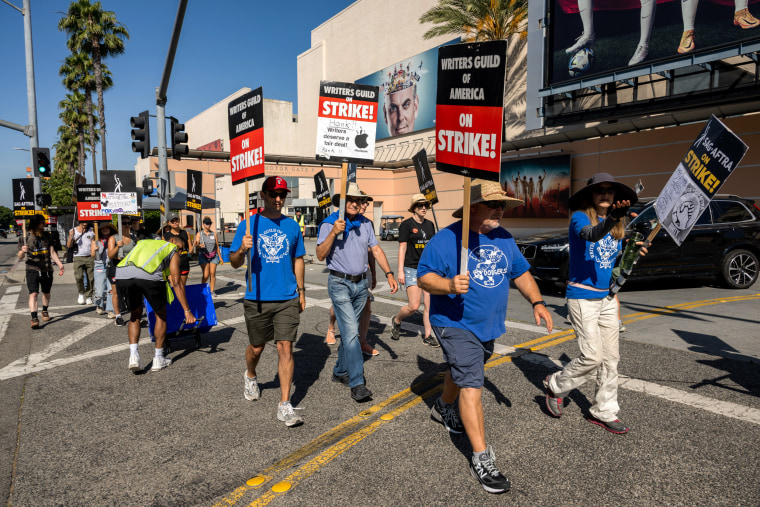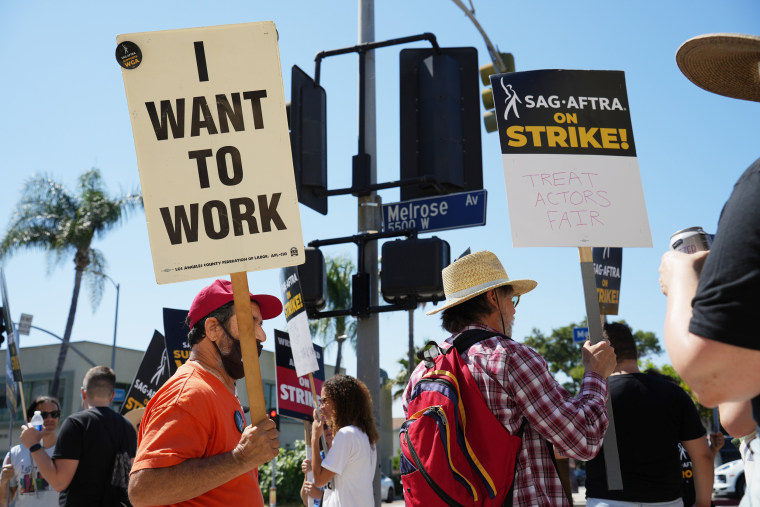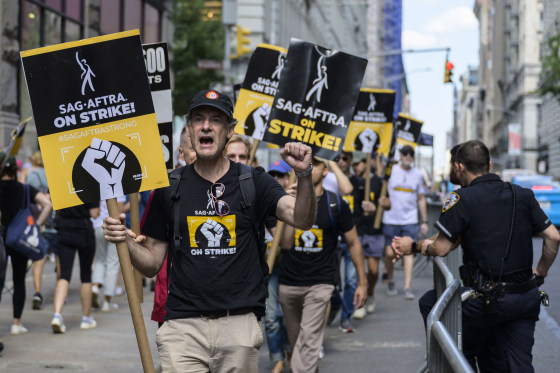When the Writers Guild of America went on strike in early May, a first-year member of the union who most recently worked on an Apple TV+ series was gripped by panic. She was already struggling to find her next writing job, and now she would most likely be out of work for months.
The writer, who spoke on the condition of anonymity because she was concerned about professional repercussions, said she fully supports her WGA colleagues who are on the picket lines. But she is taking a financial hit, uncertain when she will have a steady flow of income again.
“I feel like I’m subsidizing this strike with my savings in a way that’s starting to get scary,” the 35-year-old writer said.
She has cobbled together stopgap gigs: dog-walking, nannying, assisting someone with travel arrangements, filling out online surveys that pay “literal pennies.” She is relying on food assistance and living off savings that she had “squirreled away” over the last five years. She expects she can last on her cash reserves for six months before “fully tanking.”
“I wrote on an award-winning show last year,” she said, “and I’m literally picking up dogs--- right now.”
She is not the only Hollywood professional feeling anxious. The industry’s rank-and-file screenwriters have been off the job for nearly 100 days, and screen actors have been on strike for more than three weeks. The dual labor stoppages have pushed some workaday scribes and performers into precarious financial situations — with no end in sight.
Both the WGA and SAG-AFTRA, the actors union, appear to be far away from reaching deals on new contracts with the Alliance of Motion Picture and Television Producers, a trade association that bargains on behalf of major studios and streaming platforms. (The group represents NBCUniversal, the parent company of NBC News.) WGA and AMPTP representatives met face to face Friday for the first time in three months, but the two sides have not agreed to resume negotiations.

In recent weeks, entertainment industry workers have expressed dismay on social media over a quote published by the trade publication Deadline that was attributed to an unnamed studio executive. “The endgame is to allow things to drag on until union members start losing their apartments and losing their houses,” the executive was quoted as saying.
In a statement, the AMPTP said: "The anonymous people cited in that story are not speaking on behalf of the AMPTP or member companies, who are committed to reaching a deal and getting our industry back to work."
The writers and actors on strike are seeking higher base compensation, stricter safeguards against use of artificial intelligence and other changes to the status quo.
“We’re not enjoying this. We’re not doing this because we make a s---load of money and we want more money. We’re doing this because AI is a huge issue, because people might lose work,” said Paul Varacchi, a SAG-AFTRA stunt performer and fight coordinator whose television credits include “The Good Fight” and “Daredevil.”
Varacchi, 45, feels he has been taking it on the chin all year. He used to supplement his stunt work with a job at Disney on a team that oversees Covid health and safety protocols on sets. He was laid off in early June amid companywide cuts.
Then came the strike, which he feels has put his performance career “on pause” indefinitely. “I’ve kind of lost everything, including my side hustle,” he said, referring to his former job at Disney. He and his wife have a newborn daughter, and their household expenses are on the rise at a particularly inopportune time.
Dana Morgan, a SAG-AFTRA stunt performer and actor who has worked on TV shows like “Dead Ringers” and “Madam Secretary,” said she and her husband are dipping into their savings to survive. He got a job at a restaurant to help pay the bills. She is having a difficult time finding remote work. She’s on a waitlist for a gig with Uber Eats.
The strike exacted a cost on Morgan’s side hustle, too. In addition to her on-screen career, she acts as a liaison between physical locations and productions hoping to shoot there. But because the vast majority of film and television projects are on hold, so is that secondary source of income.
Morgan, who lives on Staten Island, New York, expects she and her husband will have all but depleted their savings by September.
The SAG-AFTRA Foundation, a nonprofit organization that supports actors during crises, processed more than 30 times its typical number of applications for emergency aid last week, the organization’s president, Emmy-winning actor Courtney B. Vance, said in a statement.
“Our Emergency Financial Assistance Program is here to ensure that performers in need don’t lose their homes, have the ability to pay for utilities, buy food for their families, purchase life-saving prescriptions, cover medical bills and more,” Vance said. “It’s a massive challenge, but we’re determined to meet this moment.”

The foundation raised more than $15 million in July thanks to donations from George Clooney, Leonardo DiCaprio, Dwayne Johnson, Julia Roberts, Meryl Streep, Oprah Winfrey and other A-list stars.
“I remember my days as a waiter, cleaner, typist, even my time on the unemployment line,” Streep said in a statement. “In this strike action, I am lucky to be able to support those who will struggle in a long action to sustain against Goliath.”
Corey Dashaun, a third-year WGA member who was credited on the Peacock series “One of Us Is Lying,” described the last few months as an emotional “roller coaster” that has tested the resilience of early-career screenwriters — especially Black and queer creators like him. (Peacock and NBC News are both owned by NBCUniversal.)
The strikes have upended the entertainment business “right as we’re finally getting opportunities to get in the door,” said Dashaun, 34, who lives in Los Angeles. “It’s demoralizing to try to build a successful career right now.”
Dashaun has managed to live off a “nest egg” of earnings he generated from writing jobs before the strike, he said, but “I by no means feel comfortable that my savings will last unless we go back to work soon.”
In interviews, WGA and SAG-AFTRA members were frank about the financial toll of the strike but firm in their resolve to keep fighting. It’s a sentiment that has been echoed by many of the industry’s “below-the-line” workers, a category that includes hairdressers, costume designers, camera operators, carpenters and other professionals represented by different unions, such as the International Alliance of Theatrical Stage Employees.
Morgan said the strike “absolutely needed to happen,” in part because her SAG-AFTRA peers are forcefully pushing back against what she described as a systemic problem in the business: more work for less pay and an increasingly smaller slice of corporate profits.
“The pain that we are suffering financially is a short-term sacrifice for something that’s going to help us in the long run,” she said. “We’ll survive.”

